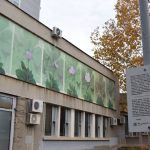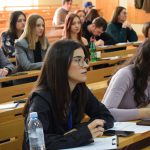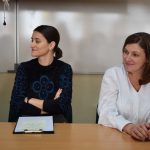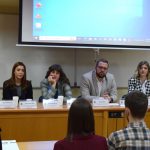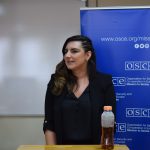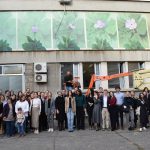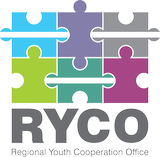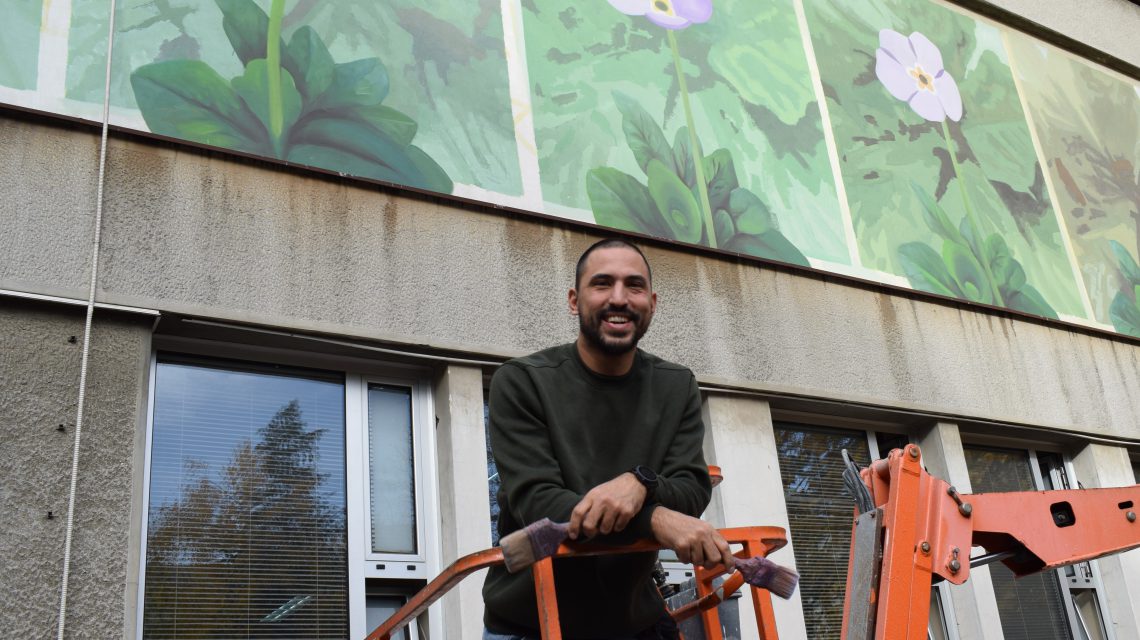Belgrade- RYCO Local Branch in Serbia within RYCOgnized project supported initiative “Paint for Peace: Engaging Students in Youth, Peace, and Security”, which was designed and organized by students of the master’s study Peace, Security and Development within the subject “Joint project”, was realized at the Faculty of Political Sciences, University of Belgrade.
The project consisted of painting a mural on the facade of the Faculty of Political Sciences depicting the Ramonda Serbian flower in order to promote the values associated with the Youth, Peace and Security Agenda, as well as the “Youth, Peace and Security” conference that was held on 2nd December on the Faculty of Political Sciences. Students had a chance to discuss the topics of gender equality, violence against women and girls and the current issue of armed violence.
The conference was opened by the students of the Master’s program Peace, Security and Development, Ms. Milica Đoković and Mr. Milan Petković, who announced that the conference will discuss the most important topics related to young people, their participation and the role that young people play in society.
Ms. Augusta Featherstone addressed the audience on behalf of the Organization for Security and Cooperation in Europe (OSCE) Mission in Serbia, who emphasized that it is a great pleasure to work with young people, for the needs of young people, not only in Serbia, but in all contracting parties. Ms. Ivana Markulić, on behalf of the RYCO LBO Serbia, emphasized the importance of the Faculty of Political Sciences as an institution where scientific research is conducted on these topics, but also academic discussions in order to reach a solution. “The main reason why we supported this project is precisely the young people, who as citizens can make changes and that’s why you should be here, in a place where you can debate, re-think and discuss these topics.” Ms. Markulić said.
Vice-dean for studies of the first degree of higher education at the Faculty of Political Sciences, prof. Dr. Natalija Perišić pointed out that the strongest side of this institution is its students who enjoy an interdisciplinary approach and the possibility of looking at a wider aspect of the studied topics. One of the leaders of the master’s study Peace, Security and Development and the mentor of this project, prof. Dr. Filip Ejdus, explained how the students created the project, designed and realized the painting of the mural and the organization of the conference within the subject “Joint project”. He thanked the students for the initiative, as well as the Regional Office for Youth Cooperation and the Organization for European Security and Cooperation for recognizing the importance of this project and helping in its implementation.
Opening remarks were given by Ms. Milena Stošić, RYCO Head of Programs. She referred to the similarities and differences between the two UN agendas (2250 and 1325) that are dedicated to youth and women, and emphasized that their greater synergy is needed. She also emphasized why women and young people should be actors of implementation of these agenda, not just be perceived as victims and objects of security measures.
After the introductory part of the conference, a mural of Ramond Serbica was unveiled on the building of the Faculty of Political Sciences, authored by Andrej Žikić Artez. Ramonda serbica, commonly known as the Serbian Phoenix Flower, is a rare and resilient plant endemic to the Balkans. It is known for its ability to survive drought and remarkably revives upon contact with moisture. This perennial, featuring rosette leaves and purple flowers, symbolizes endurance and rebirth, serving as a poignant reminder of nature’s resilience. In Serbia, it is used as a symbol of Armistice Day, commemorating the end of World War I. This mural represents youth’s role in fostering peace and societal resilience in the face of violence.
The topic of the first panel was “Gender-based violence”, which was addressed by Ms. Zorana Antonijević, an expert on gender equality and youth inclusion, Ms. Katarina Popović, a master’s student at the Faculty of Political Sciences, and Ms. Miljana Pejić, Secretary General of the National Youth Council of Serbia (KOMS). Ms. Antonijević pointed out that violence against women is deeply rooted in the history and essence of our communities. In order to change the current situation, education must play its role and recognize these types of violence. Ms. Popović, a master’s student at the Faculty of Political Sciences, reflected on the paper in which she wrote about a case that united young women and made them fight together against misogyny in the media. According to Ms. Pejić, social networks must recognize these types of violence, because young people use them as a basic channel of communication. She also shared what the National Youth Council of Serbia is doing on this topic, but overall what is their contribution to the implementation of the UN YPS Agenda. This panel was moderated by Ms. Nevena Robajac, student of the Peace, Security and Development department.
“Empowering the future: young people as protectors of public security” was the topic of the panel where students Ms. Katarina Bogićević, Ms. Dragana Radusilović, Mr. Edis Muminović, Ms. Ksenija Đorić, Ms. Iva Kojić, Ms. Maša Mihajlović, Mr. Konstantin Mitić and Ms. Bisera Marković presented proposals for practical policies: Gender Based Violence, Peer Education, Youth and Security as common good, Online Security of Young People and Reform of Serbian Council for Security towards inclusion of Minority groups. The moderator of the panel was Master’s student of Peace, Security and Development department Mr. Spencer Reynolds.
On the third panel, “The impact of armed violence on youth security in Serbia”, researcher Mr. Dušan Stanković from the Belgrade Center for Security Policy, expert in security sector management and conflict transformation Ms. Sonja Stojanović Gajić and students of the Faculty of Political Sciences Mr. Srđan Baša and Mr. Dimitrije Kljajić spoke. The moderator of the panel was Ms. Milica Starinac, a Master’s student in Peace, Security and Development.
Mr. Stanković spoke about the perception of the weapons problem in Serbia. He highlighted this problem as high-risk, and as a result of the legacy of the 1990s. Ms. Stojanović Gajić referred to the importance of the gender, age and cultural context that must be present in dealing with this topic. Students Srđan Baša and Dimitrije Kljajić presented a practical policy proposal that is directly aimed at regulating the negative impact of armed violence on the safety of young people.
This initiative was also supported by OSCE Mission to Serbia and company Tenge DOO. RYCOgnized project is financed by the Federal Foreign Office.
